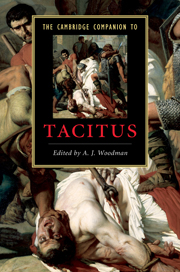Book contents
- Frontmatter
- Introduction
- Part I Contexts
- Part II Texts
- Part III Topics
- Part IV Transmission
- 16 From manuscript to print
- 17 Tacitus and political thought in early modern Europe, c. 1530-c. 1640
- 18 Gibbon and Tacitus
- 19 A dangerous book: the reception of the Germania
- 20 Tacitus and the twentieth-century novel
- 21 Tacitus’ Syme
- Chronological table
- Abbreviations and bibliography
- Index
18 - Gibbon and Tacitus
from Part IV - Transmission
Published online by Cambridge University Press: 28 March 2010
- Frontmatter
- Introduction
- Part I Contexts
- Part II Texts
- Part III Topics
- Part IV Transmission
- 16 From manuscript to print
- 17 Tacitus and political thought in early modern Europe, c. 1530-c. 1640
- 18 Gibbon and Tacitus
- 19 A dangerous book: the reception of the Germania
- 20 Tacitus and the twentieth-century novel
- 21 Tacitus’ Syme
- Chronological table
- Abbreviations and bibliography
- Index
Summary
Edward Gibbon (1737-94) is today not often read as a 'colleague' by professional historians of Roman or Byzantine history. He is read rather, if at all, as a 'classic' of English literature, of which he is unquestionably an ornament. His luminous and eminently parodiable style has not pleased all his readers equally, however. But its intricate subtleties demonstrate time and again the truth both of Buffon's adage that 'le style c'est l'homme même' and of A.D. Momigliano's mantra that a history - any history - cannot be understood apart from the historian who composed it. Gibbon was besides an outstanding Latinist, and did not merely parade but made consistently excellent practical use of his 'seraglio' (his personal library) of 6,000-7,000 volumes. Though judged weak in source-criticism by the highest contemporary standards applied at Göttingen, Gibbon more than justifies the place he claimed - with David Hume (for some others, the first truly modern historian) and William Robertson - among the triumvirate of leading English-language historians of the second half of the eighteenth century.
- Type
- Chapter
- Information
- The Cambridge Companion to Tacitus , pp. 269 - 279Publisher: Cambridge University PressPrint publication year: 2010
- 1
- Cited by

